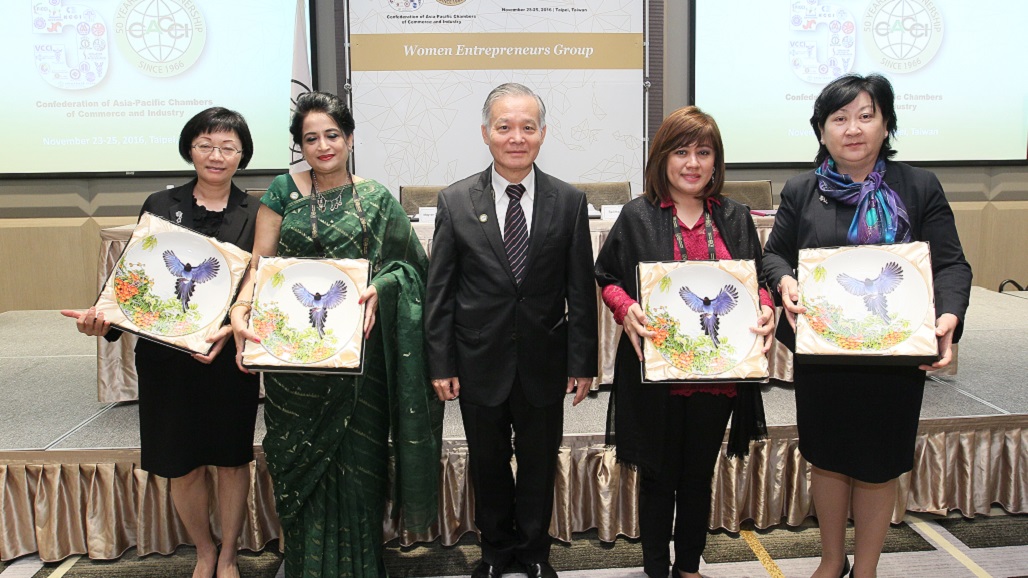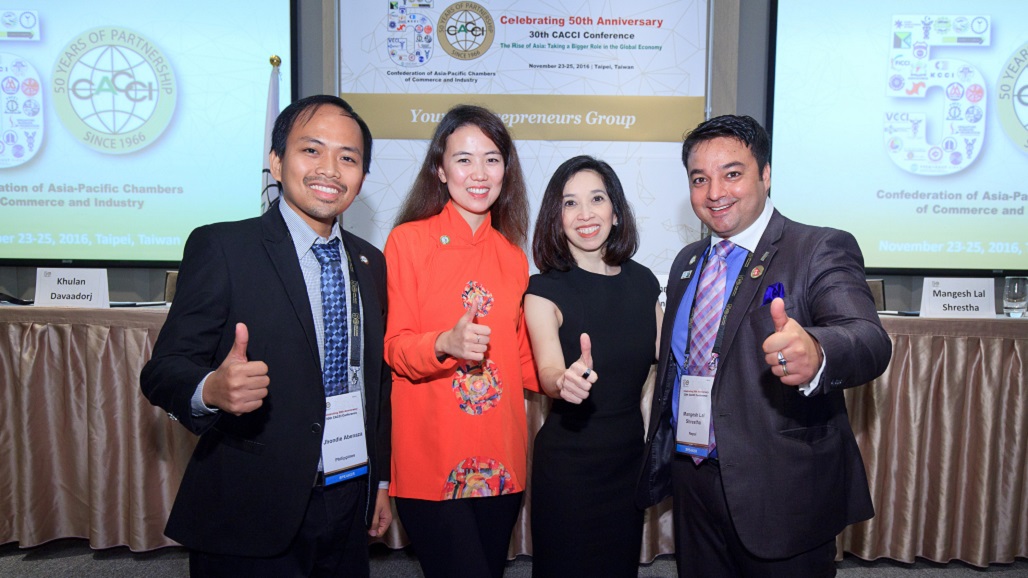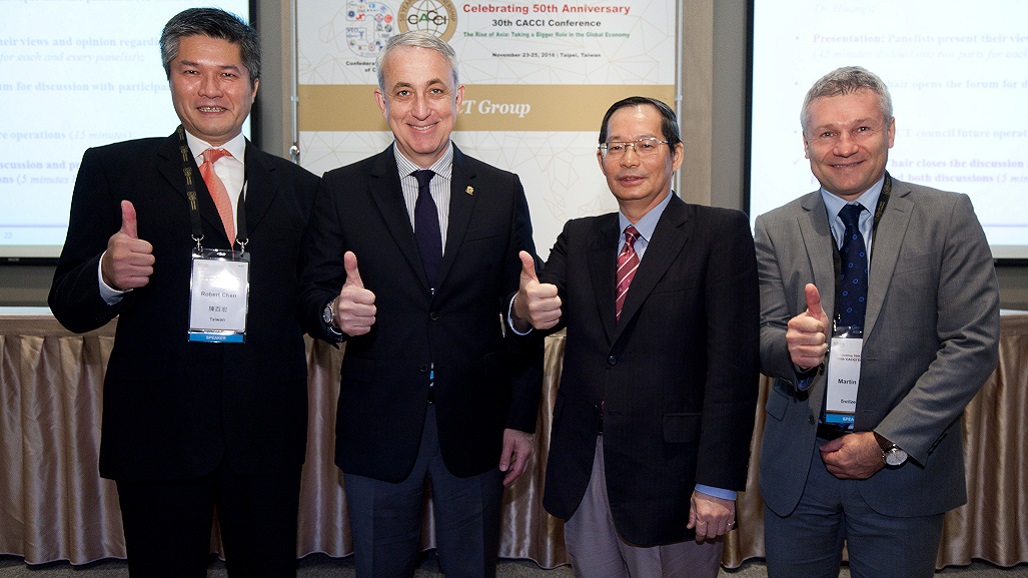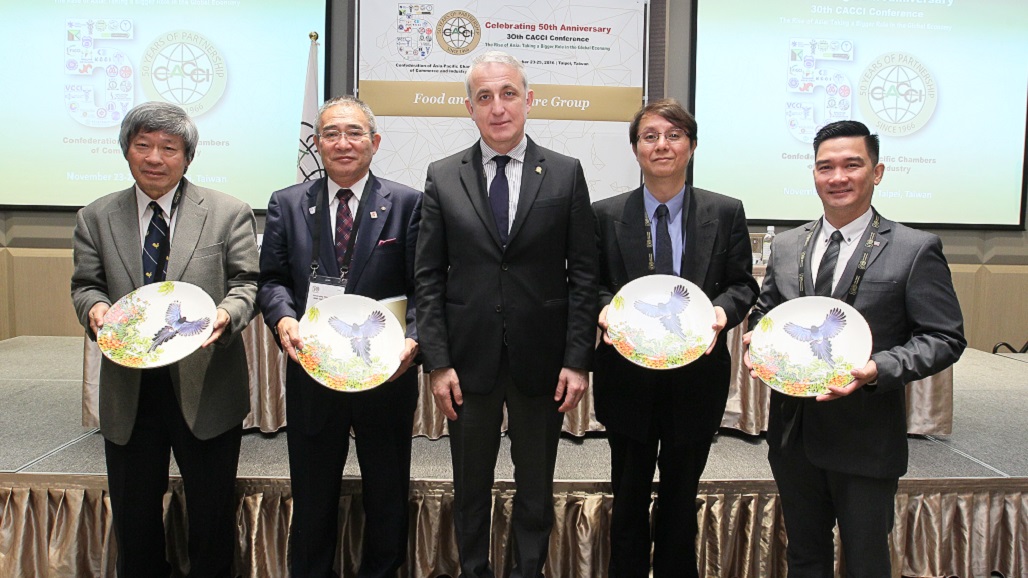
The panelists for this session were: (a) Ms. Lillian Chu, Senior Partner, Tsar & Tsai Law Firm; (b) Mrs. Magvan Oyunchimeg, CEO, Mongolian National Chamber of Commerce and Industry; and (c) Mrs. Carmel De Pio-Salvador, Managing Director, Global Carrier Phils. Inc.. Chairing the session was Ms. Selima Ahmad, President, Bangladesh Women Chamber of Commerce and Industry;
Ms. Selima Ahmad, President of the Bangladesh Women Chamber of Commerce and Industry (BWCCI) and who chaired the roundtable discussion on women entrepreneurship, informed the Council that the session was attended by some 20 local and overseas delegates and featured the following panelists.
Ms. Lillian Chu from Taiwan shared with the audience her experience and observation on women entrepreneurship. According to Ms. Chu, the primary barriers faced by women entrepreneurs in Taiwan are insufficient capacity building and limited channels of information or social networks. Women entrepreneurs need to be educated to have a keen perception on the competition in the market. In building capacity, women entrepreneurs have to understand the characteristics they possess and from there they can develop their capacity to allow them to hear all different voices and to manage uncertainty and risk in the business world. Ms. Chu pointed out that with sufficient capacity, when others see only potential down-sides, they can see potential business opportunities. The capacity will also allow women to leverage and transform their experience (which might be deemed a disadvantage) into an advantage in competition. To sum up, having sufficient information across all sectors is crucial for women entrepreneurs to achieve their full potential.
The second panelist was Mrs. Magvan Oyunchimeg from Mongolia who used her work experience in the Chamber as an example to explain how to keep a balance between work and family. In addition, she also discussed the opportunities and challenges facing businesswomen in Mongolia.
Mrs. Carmel De Pio-Salvador from the Philippines, as Managing Director of a company, talked about her idea on how to develop women entrepreneurship. In her presentation, Mrs. Pio-Salvador encouraged ladies to dream and make their dreams come true, as it is the way to realize goals. Also, whenever changes happen, they could be opportunities for development and growth which could help people move forward. Emphasized the importance of family and learning, Mrs. Pio-Salvador shared several examples and photos of her own company to demonstrate the best practices of a corporate.

This session featured the following panelists: (a) Mr. Jhondie Abenaza, Founder and CEO, Zeenoh; (b) Ms. Khulaan Davaadorj, Founder and CEO of Natural Essentials LLC; and (c) Mr. Mangesh Lal Shrestha, President, Nepalese Young Entrepreneurs Forum. The session chairman was Ms. Anna Marie Periquet, Chairperson, CACCI Young Entrepreneurs Group Asia-Pacific (YEGAP).
Ms. Anna Marie Periquet, Chairman of the CACCI Young Entrepreneurs Group of Asia-Pacific (YEGAP), informed the Council that the roundtable discussion on youth entrepreneurship was attended by some 70 delegates and featured three panelists as well as herself, each one of whom made their respective presentations.
Ms. Periquet delivered the Opening Statement and welcomed all the participants. Ms. Periquet gave an overview of the state of entrepreneurship in the Asia Pacific region, with special notation on the youth sector and start-up businesses. She stressed that there is a need for young entrepreneurs to communicate with their counterparts in other countries using the YEGAP and the CACCI as the platform for achieving this objective.
Mr. Jhondie Abenaza, an award-winning technology entrepreneur from the Philippines, shared his best business practices in the business of information technology and software entertainment. Mr. Abenaza also talked about his extensive experience in the production of websites, software applications and video games. He stated that starting a business is already a challenge and expanding the business is even a greater challenge. He expressed his hope that he would be able to pick-up some advice from his colleagues from other countries on how to further foster entrepreneurship in the Philippines.
Mr. Mangesh Lal Shrestha, President of the Nepalese Young Entrepreneur’s Forum and Director and CEO of CAS Total Solutions, shared his wealth of experience in the ICT sector. He also discussed the many benefits of doing business in Nepal, particularly in the telecommunications, healthcare, energy and tourism industries. Mr Shrestha also gave an overview of the present state of entrepreneurship in Nepal, as well as its problems and concerns. He also made a presentation on the Nepalese Young Entrepreneur’s Forum, focusing on its activities and the important role it plays in helping contribute to the vitality of the communities, the SMEs, and the local economies. He also expressed his personal view on Nepal’s possible role in the Asia-Pacific region.
Ms. Khulan Davaadorj, a Mongolian entrepreneur, shared her business testimonial from the “Kitchen to Store” as founder of Natural Essentials LLC in 2014. Her company produces natural and healthy products with unique Mongolian raw materials in the most environmentally friendly way. She shared how she started Mongolia’s first ever organic skincare brand LHAMOUR with the vision to be a leading role model, proving to people that Mongolia can produce high quality products. Ms. Davaadorj discussed her efforts in trying to pave the way for Mongolians to overturn conventions and start little by little in order to eventually contribute to positive social change and economic growth in Mongolia and even Asia. She also highlighted her role as a lead advocate of the entrepreneurship movement in Mongolia.
During the open forum, some of the participants shared their respective country’s state of entrepreneurship and programs. They included: India, Philippines, Bangladesh and Taiwan. Participants also discussed trends and developments, concerns, and prospects for growth of entrepreneurship in the region. They likewise explored possible areas of cooperation among CACCI members in promoting entrepreneurship among the start-up entrepreneurs. The participants agreed that the YEGAP is a good role model for chambers that are creating entrepreneurs group in their respective chambers and countries.

The featured panelists included: (a) Robert Chen, Senior Manager, Taiwan Telematics Industry Association; and (b) Mr. Martin Frick, Managing Director, Asia Pacific, Temenos. Chairing the session was Dr. G. J. Huang, Chairman, CACCI Asian ICT Council, who also made a presentation during the session.
Dr. G. J. Huang, Chairman of the CACCI ICT Council reported that the roundtable discussion on the ICT sector featured three speakers, including himself.
Dr. Huang talked about the Internet of Things (IoT) and the Internet of Everything (IoE) and their ethical, legal and social implications. He also shared his views on how ICT is turning traditional notions of the service industry on its head: from Uber, a company with no cars that offers rides, to Facebook, a media company that creates no content; Airbnb, a company that offers rental property but owns no property to Alibaba, a commercial enterprise with no stock of goods. What these modern companies have in common is that they exemplify the shared economy in which consumers provide and receive direct services while the corporation’s role is merely limited to providing the tools to facilitate such exchanges. The shared economy not only brings suppliers closer to consumers, but it possesses the potential to turn everyone into both a supplier and a consumer. In so doing, it can transform everyone into an entrepreneur.
Martin Frick, Managing Director Asia Pacific at Temenos, made a presentation on “How Technology is Changing Banking and Financial Services and Why Customers will Demand It.” As technology continues to make life more convenient, bank customers are also beginning to expect more from banks. More and more customers expect their banks to assist them in meeting their financial goals, reward customer loyalty, save money while receiving products’ recommendations. Some Chinese banks have been known to use their mobile phone apps to constantly track their customers so that when they enter a store, the app can offer real-time financial services associated with the products in the store. The future role of banks will not be limited to the conventional understanding of banking. Rather, the future role of banks will be to serve as a customer’s lifetime partner/financial adviser.
Mr. Robert Chen, Senior Manager, Taiwan Telematics Industry Association, talked about the Emerging Trend of Telematics Industry and Applications. In his speech, Mr. Chen noted that like the rest of society, automobiles are also being redefined by advancing technology. The future of automobiles will be the connected car that can offer an important link in providing usage-based insurance as well as advanced driver assistance systems and even fleet management. Other examples of advances in automobile technology include the electric car and the autonomous car that, at one extreme, can be fully automated without needing driver input. Finally, the increasingly technologically sophisticated automobile also requires incredsingly advanced cybersecurity measures. These advancing technology may transform the traditional understanding of the automobile from an issue of ownership to an issue of usership. In the age of Uber when anybody can be a taxi driver, ownership seems less important than practical questions of usage.

The invited panelists were Dr. Wei Fang, Professor, Department of Bio-Industrial Mechatronics Engineering, National Taiwan University; Mr. Rommel Sim Gerodias, President & CEO, Sauber Professionals, Inc.; and Mr. Keiichiro Wakai, Chairman, Aomori Chamber of Commerce and Industry. Invited as Session Chairman was Dr. Liang-Chou Hsia, Yu Chou Friendly Agriculture Research Institute, and Professor Emeritus, National Pintung University of Science and Technology (NPUST).
Dr. Liang-Chou Hsia, President of Yu Chou Friendly Agriculture Research Institute from Taiwan, who chaired the roundtable discussion on food and agriculture reported that, aside from himself the session featured three other speakers from Taiwan, the Philippines and Japan who shared with the audience the recent trends and developments in food and agriculture in their respective countries:
Dr. Hsia made a presentation on the latest global trends in the food industry. According to Dr. Hsia, in addition to the growing importance of food security, the shortage of food supply will be an inevitable development in the future, and people would need to not only avoid wasting food, but also explore more sources of nutrition, including even eating worms.
Dr. Wei Fang, Professor and Former Chairman, Department of Bio-Industrial Mechatronics Engineering, National Taiwan University, spoke on the idea of “plant factory” not only for solving worldwide challenges ahead but also open up worldwide business opportunities.
Mr. Rommel Sim Gerodias, President and CEO, Sauber Professionals, Inc. from the Philippines focused on food security, analyzing the global burdens of food-borne diseases, discussing evolving food security problems, and shareing his views on the future of food security. In conclusion, he indicated that in the future, people can expect an increasing number of devices and applications within food businesses to do more testing on an increasingly diverse range of parameters. With the technological developments, there is certainly scope to increase the easeand frequency of food product testin over and abode standard tests from farm to fork.
Mr. Keiichiro Wakai, Chairman of Aomori Chamber of Commerce and Industry, talked on “Developing a new era of exchange between Tohoku in Japan and Asia through dispelling reputational damages”. Mr. Wakai said that five years and eigh monhs since “the Great East Japan Earthquake” that struck the Tohoku region and caused unprecedented damage, the reconstruction is underway, thanks to the enormous support from the people in Japan and overseas, and the tireless effort of the people in the affliicted areas.





